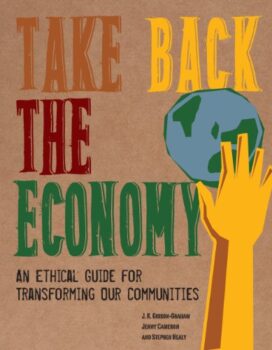
Book Title: Take Back the Economy: An Ethical Guide for Transforming Our Communities” is a Authors: J. K. Gibson-Graham (Author), Jenny Cameron (Author), & Stephen Healy
Summary
“Take Back the Economy: An Ethical Guide for Transforming Our Communities” is a book authored by J. K. Gibson-Graham, Jenny Cameron, and Stephen Healy. The book presents an alternative perspective on economy and community development, challenging the traditional notions of capitalism and offering a vision for more ethical and inclusive economic practices.
The central theme of the book revolves around the idea that the current dominant economic model, often characterized by large-scale capitalism and globalization, is not the only way communities can function economically. The authors argue for a decentralized and community-oriented approach to economic activity, emphasizing the importance of local economies and grassroots initiatives.
The book introduces readers to diverse examples of small-scale community-based economic practices that promote sustainability, social justice, and collective well-being. These examples range from local co-operatives, community currencies, and time banks to other forms of alternative economies. By showcasing these various examples, the authors aim to inspire readers and provide practical guidance on how communities can “take back” their economies from large corporations and unsustainable practices.
“Take Back the Economy” challenges the mainstream economic discourse and encourages readers to consider a more inclusive, resilient, and socially conscious economic model. It is a call to action for individuals, communities, and policymakers to rethink and transform economic practices to create a more just and sustainable world. The book ultimately provides an ethical guide for communities seeking to revitalize their local economies and promote social and environmental well-being.
Key Ideas
“Take Back the Economy” introduces several key concepts and recommendations that challenge conventional economic thinking and promote more ethical and community-oriented practices. Some of these key concepts and recommendations include:
Diverse economies: The book introduces the concept of “diverse economies,” which challenges the notion that there is a single, dominant economic system. Instead, the authors argue that multiple economic practices coexist within a community, encompassing both formal and informal activities. Recognizing these diverse economies allows for a more inclusive understanding of economic life.
Community economies: The authors advocate for a shift towards community-oriented economic practices, where communities actively participate in decision-making and have control over their economic activities. This involves encouraging the growth of local businesses, cooperatives, and other community-based initiatives that prioritize social well-being and environmental sustainability.
Ethical consumption: The book emphasizes the importance of conscious consumer choices that support ethical and sustainable products and services. By choosing to buy locally produced goods, supporting fair trade practices, and minimizing consumption of environmentally harmful products, individuals can contribute to a more responsible and just economy.
Solidarity economy: “Take Back the Economy” promotes the idea of a solidarity economy, which fosters cooperation and mutual support among different community members. This involves building networks and alliances between local businesses, cooperatives, community organizations, and individuals to create a stronger and more resilient economic system.
Alternative currencies: The book discusses the use of alternative currencies, such as community currencies and time banks, as a means of decentralizing economic power and promoting community exchanges. These currencies can facilitate trade and services within a community, promoting trust and reducing dependency on traditional financial institutions.
Localism: Emphasizing the importance of localism, the authors encourage communities to prioritize locally sourced products and services. By supporting local producers and businesses, communities can foster economic self-reliance and reduce their dependence on global supply chains.
Gender and diversity considerations: The book pays special attention to the roles of gender and diversity in economic practices. It highlights the importance of recognizing and valuing the often overlooked economic contributions of women and marginalized groups within communities.
Political engagement: “Take Back the Economy” advocates for political engagement and activism to challenge dominant economic structures and advocate for more inclusive policies. By participating in local politics and advocating for community-oriented economic policies, individuals can drive positive change.
The book combines theoretical insights with practical examples to guide readers in understanding and implementing these key concepts and recommendations. Through these ideas, the authors envision a transformation of communities towards more ethical, sustainable, and locally rooted economies that prioritize well-being and the common good.
